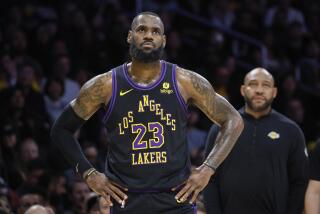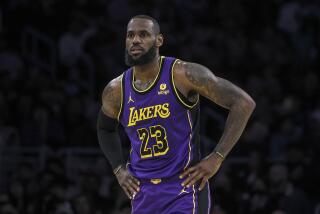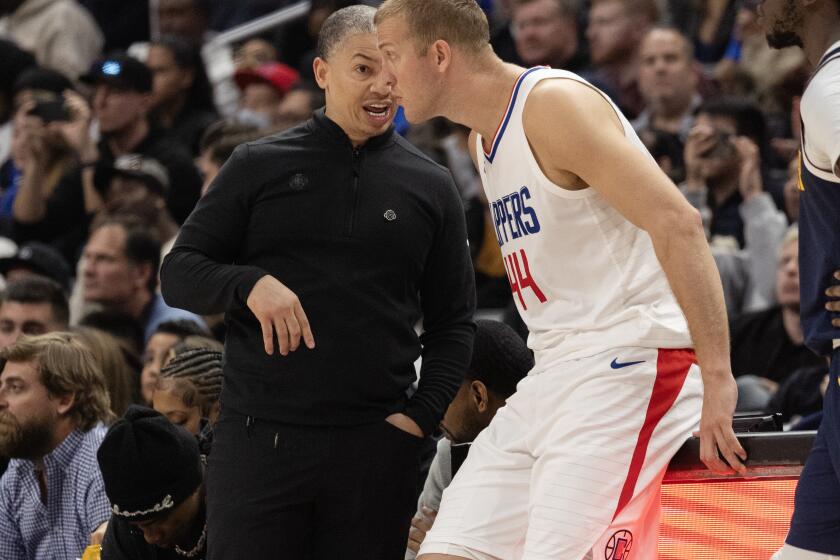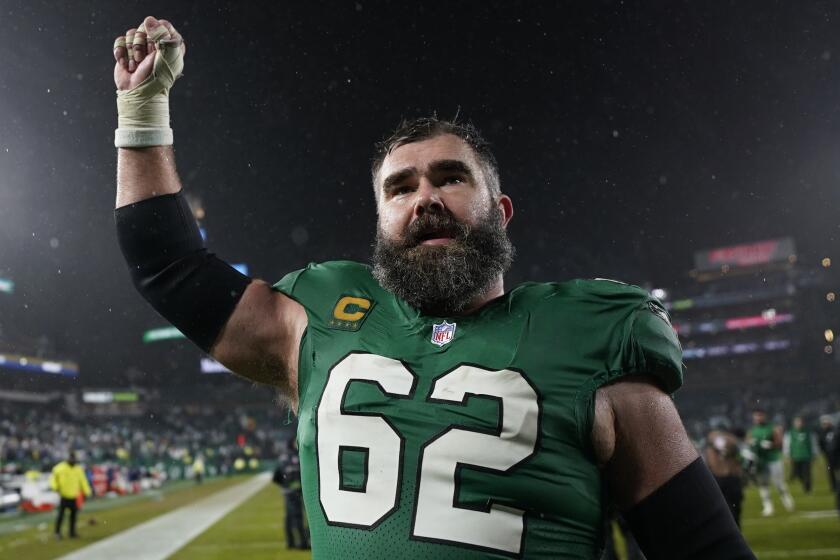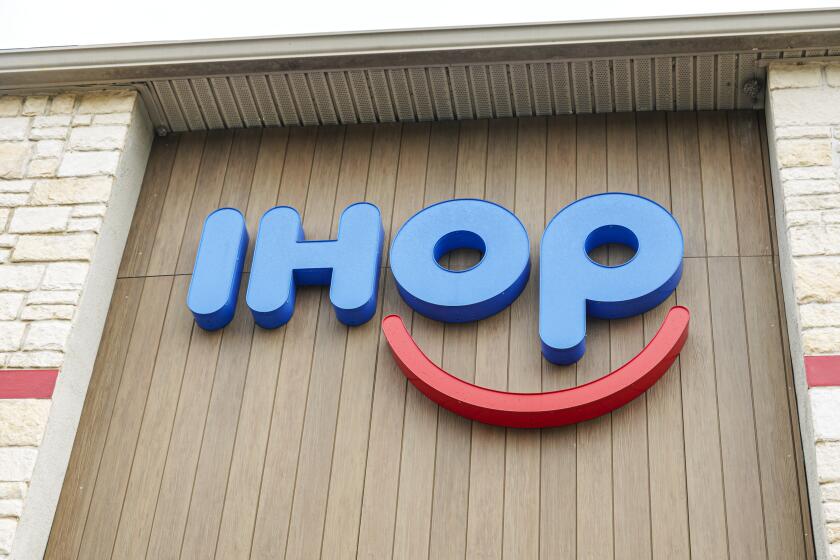New NBA deal may curtail Lakers’ free-spending ways
Celebrate good times?
The NBA lockout appears to be over, but so might the Lakers’ free-spending ways.
The Lakers, often the league leaders in blowing past the luxury-tax threshold, were one of the teams targeted by small-market owners and NBA officials in the proposed collective bargaining agreement.
If players and owners ratify the new deal with a majority vote this week, the Lakers face an incredibly steep tax designed to instill more league parity and less spending by deep-pocketed teams.
League officials aren’t exactly shy about hiding their approval.
“The luxury tax is harsher than it was in the past deal and we hope it’s effective,” NBA deputy commissioner Adam Silver said.
The first two years of the agreement still hold the traditional dollar-for-dollar penalty for teams exceeding the tax threshold, but the future poses a financial trap for the Lakers that might affect their desire to take on large salaries.
For the 2013-14 season, the luxury-tax penalty moves from dollar for dollar to a $1.50-to-$1 ratio for the first $5 million a team is over the threshold, a $1.75-to-$1 ratio if a team is $5 million to $10 million above the threshold, a $2.50 ratio for $10 million to $15 million, and a $3.25 ratio for $15 million to $25 million beyond the threshold.
The Lakers’ payroll last season was $91 million, the NBA’s largest, and they paid an additional $21 million in penalties because they were that far over the tax threshold. In two years, a $91-million payroll would cost the Lakers a staggering $68 million in additional taxes.
Team officials are not allowed to be interviewed until the deal is ratified, but it won’t spoil the surprise to say the Lakers aren’t thrilled.
In 2013-14, they have already committed a whopping $61.5 million to only four players — Kobe Bryant ($30.5 million), Pau Gasol ($19.3 million), Metta World Peace ($7.7 million) and Steve Blake ($4 million).
Uh-oh. New tax rules creating havoc in big cities across America.
“We feel ultimately it will give fans in every community hope that their team can compete for championships,” said Silver, speaking indirectly to Memphis, Charlotte, Sacramento, Indianapolis, Milwaukee, Minneapolis, et al. “And that their basis for believing in their team will be a function of management on that team rather than … how deep the owners’ pockets are or how large the market is.”
There are other reasons the Lakers might have to stop the payroll party.
Under the agreement, teams that cross the tax threshold four times in a five-year span will also be hit with a “repeater tax,” an additional dollar-for-dollar penalty on top of any existing penalties.
Even if the Lakers try to maintain their spending ways, they face immediate financial obstacles aimed at irritating big-money teams.
Most teams over the cap can use the mid-level exception for a four-year contract worth about $22 million for a middle-of-the-road free agent. The Lakers, however, will be so far over the tax threshold this season they can use only one “mini mid-level” contract to woo a free agent — a three-year deal worth about $10 million.
It’s tough to attract a big name with so little to offer financially, though the Lakers hope to land a veteran who is cut by another team, specifically Baron Davis or Rashard Lewis.
The Lakers currently owe $91 million to only 11 players, including team options they’re expected to exercise on second-year players Devin Ebanks and Derrick Caracter.
They’ll get some tax relief by waiving World Peace or Luke Walton via the one-time “amnesty provision” that teams can employ, cutting one player and not having his salary count against their cap and any taxes.
World Peace (three years remaining, $21.5 million) is more likely to be waived than Walton (two years, $11.5 million) because of his larger contract and the tax implications down the road.
Walton’s contract expires in 2013, right before the luxury taxes are ratcheted up, but World Peace will cost the Lakers an estimated $27 million in salary and taxes in 2013-14 under the new rules if the Lakers are $10 million to $15 million over the tax threshold that season, a conservative estimate at this point.
World Peace averaged a career-low 8.5 points last season. He is 32 years old.
The Lakers aren’t forced to make their amnesty decision before the season begins, but if World Peace is gone, it might be the first of many financial sacrifices for them in coming years.
Small-market teams, rejoice!
Oh, they already are?
San Antonio Spurs owner Peter Holt said the agreement would “allow us as a small market to be competitive. It’ll create parity across all 30 teams. We’re excited for the fans, we’re excited to start playing basketball, for the players, for everybody involved.”
Those who might not be so excited: the Lakers and their fans.
twitter.com/Mike_Bresnahan
More to Read
Get our high school sports newsletter
Prep Rally is devoted to the SoCal high school sports experience, bringing you scores, stories and a behind-the-scenes look at what makes prep sports so popular.
You may occasionally receive promotional content from the Los Angeles Times.
